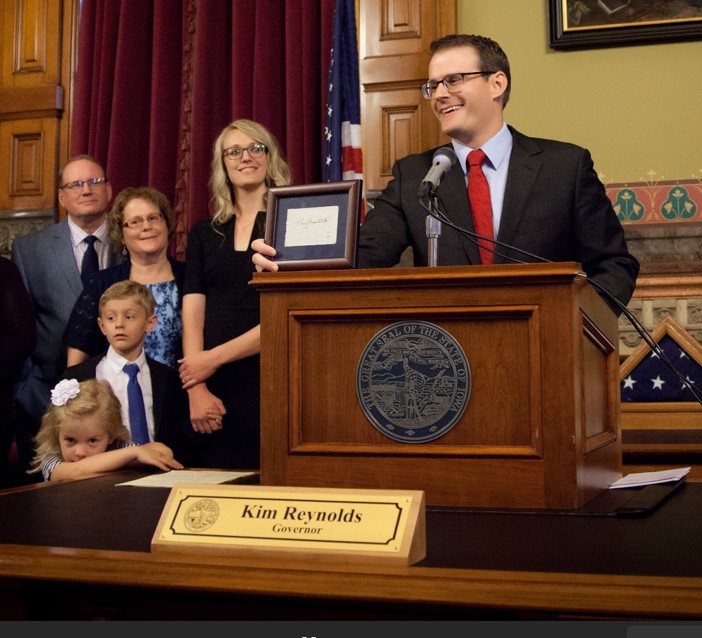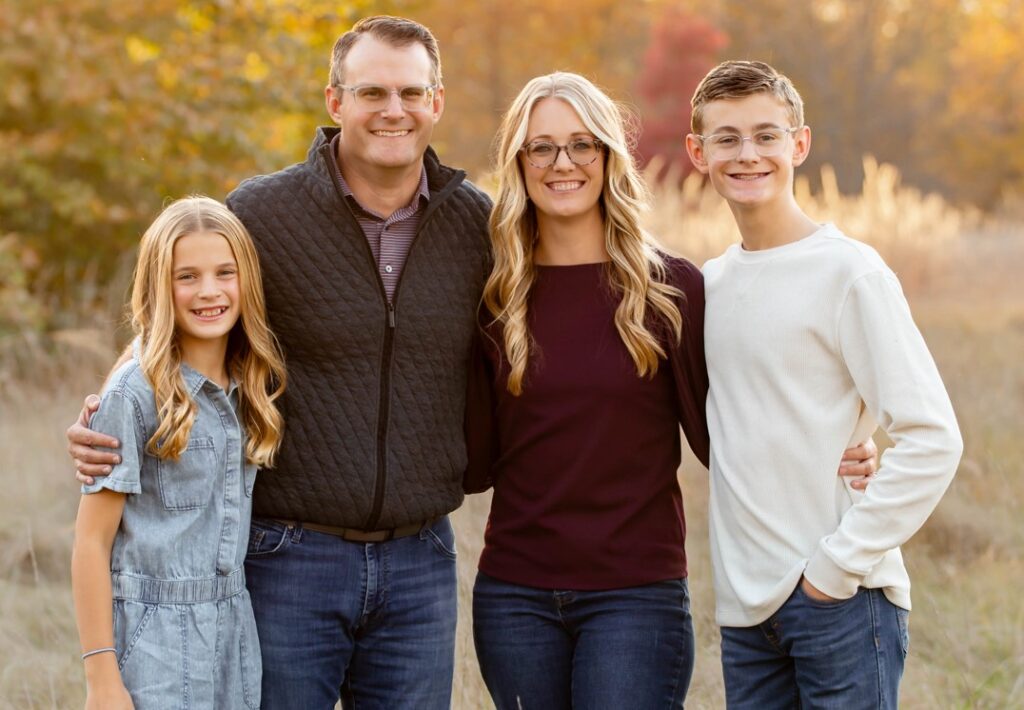Meet Adam Gregg, new leader of Iowa Bankers Association

Kathy A. Bolten Jan 24, 2025 | 6:00 am
9 min read time
2,115 wordsBanking and Finance, Business Record InsiderIn late May last year, Adam Gregg got a social media alert reminding him of a photo taken of him and his family seven years earlier when he was tapped to be Iowa’s lieutenant governor.
Gregg’s son, Jackson, was 6 at the time; his daughter, Lauren, was 4.

In May 2017, then-Iowa Gov. Terry Branstad was confirmed as the United States’ ambassador to China. Kim Reynolds, then the state’s lieutenant governor, became governor. She named Adam Gregg as her lieutenant governor during a news conference. Gregg is shown in the photo at the news conference surrounded by his family. Photo special to the Business Record
“They were so little and young,” Gregg said. “Something about that seven-year anniversary hit me. Where will they be in seven more years? I realized that they will have graduated [from high school] and be gone out of the house. … I started feeling a tug that maybe I wasn’t in the right place. That maybe there was something different that might be a better fit.”

Adam Gregg, with daughter, Lauren, 11; wife, Cari; and son, Jackson, 14. Photo special to the Business Record
The Iowa Bankers Association was beginning its search for a new CEO and president around the time Gregg was realizing he wanted a job that provided a more flexible — and less demanding — schedule.
Gregg and the association connected and in September the group announced that the former lieutenant governor would become president and CEO when John Sorensen retired in December. Sorensen had been the association’s leader since 1997.
Under Sorensen’s leadership, the association became the largest state banking association in the U.S. The organization, which has a staff of over 200 people, provides advocacy, workforce development and community bank solutions in insurance, mortgage and regulatory compliance. The association has 265 member banks, with a presence in nearly every Iowa community.
As Iowa lieutenant governor, Gregg visited communities in all of the state’s 99 counties, talking with community leaders, which often included bankers.
Banking “is an industry that impacts all of the other industries in our state,” said Gregg, 41. “When I visited communities with business expansions, bankers were part of the celebration because they helped make the project happen with that business owner.”
Gregg said his experience in state government as lieutenant governor, Iowa’s public defender and legislative liaison prepared him to lead the banking association. As a liaison between the governor’s office and Iowa Legislature, he advanced then-Gov. Terry Branstad’s proposed budget and policies by working with Republicans and Democrats. “I had an opportunity to work on some very complex and challenging issues and to get things done, even in a split government,” Gregg said.
The position also helped Gregg to better pay attention to details, he said. “It matters where they put the comma on page 27 of that bill because it impacts the interpretation” of the bill.
As state public defender, Gregg oversaw a staff of about 220 people and a budget of about $60 million, similar to the size of the banking association’s budget.

Adam Gregg, previously Iowa’s lieutenant governor, is now president and CEO of the Iowa Bankers Association. Photo by Duane Tinkey
Gregg’s first day at the association was Oct. 1. Over the past several weeks, Gregg has met with numerous bankers across Iowa. One thing he was surprised to learn was the prevalence of check fraud, Gregg said.
“You hear a lot about romance scams and grandparents getting scammed, but I had not heard about check fraud as a major issue,” Gregg said. “It’s the old-fashioned kind of fraud: stealing checks out of mailboxes, washing the checks, changing the payee and changing the [check’s dollar] amount. … Once you start digging into that, you realize it is happening a lot.”
Gregg said he plans to launch a statewide anti-fraud awareness campaign during the first half of 2025.
Gregg said his new job is demanding and requires him to travel around the state and country. But, he said, “I have a lot more control over my schedule and what I prioritize.”
In early January, Gregg’s son, Jackson, now 14, got his driver’s learning permit.
“I was there to be able to go for a drive with him for the first time,” Gregg said. “Those are the things that are a little bit easier now.”
At a glance
Age: 41
Grew up in: Hawarden, Iowa
Currently lives: In Urbandale
Family: Wife, Cari; son, Jackson, 14; and daughter, Lauren, 11
Education: Bachelor of Arts degree, Central College in Pella, May 2006; law degree, Drake University in Des Moines, May 2009
Work background: Attorney with BrownWinick Law Firm, September 2009 to December 2012; legislative liaison and policy adviser for the Iowa governor’s office, December 2012 to June 2014; state public defender, December 2014 to May 2017; lieutenant governor, state of Iowa, May 2017 to September 2024; and president and CEO, Iowa Bankers Association, October 2024 to present.
The following Q&A has been edited for clarity and brevity.
You’ve spent some time talking with bankers. What are some things that are on their minds that the association can help with?
One of the things that always comes up is the regulatory environment. The message lately, since the results of the presidential election, has been excitement and anticipation for more of a deregulatory environment in the financial services sector. The message that I’ve heard from Iowa bankers is that the last four years have been very challenging.
The banking industry is already highly regulated, and it got more so over the course of the last four years. That’s a particular challenge for smaller banks, who, on their own, may not have the ability to comply in ways that bigger banks have the opportunity to do so. One of the things that I’m hearing is excitement about the opportunity to maybe have a slightly different mindset from the regulators that will help extend the life of Iowa banks and also help them better serve their customers.
What is an example of a regulation bankers would like to see revised?
One that comes to mind right away is a regulation known as Section 1071 of the Dodd-Frank Act.
(The regulation requires financial institutions to collect and report to the Consumer Financial Protection Bureau information about lending to woman-owned, minority-owned and other small businesses. Financial institutions covered by the regulation include those that originate at least 100 covered small-business loans for two consecutive calendar years. Compliance is being implemented in phases with the first filing deadline set for mid-2026.)
You can argue all you want about the merits of the regulation. I think it goes too far, and I think the regulations that were implemented went much further than what the statute really required. Iowa banks are frustrated by that. But here’s where it really impacts folks: There are a lot of Iowa banks right now that are on the cusp of making a five- to six-figure technology purchase to help them make sure they are tracking compliance properly. If you have to spend $100,000 or more on technology in order to help you comply with that regulation, that’s pretty significant. It affects your ability to be profitable. It affects your ability to hire new folks. It affects your ability to lend to other small businesses in your communities. So that regulation is one that has some real impacts.
Affordable housing is an issue in Iowa — and elsewhere. Does the Iowa Bankers Association have a role in helping make housing more affordable?
Absolutely it does. One of the pieces of policy that I know the Iowa Bankers Association has historically been supportive of is the Workforce Housing Tax Credit. That’s one that I got to be familiar with during my time as lieutenant governor. I always appreciated it because it has a carve-out for the least populous 88 counties in the state. About 50% of the funds have to go to those 88 counties. Otherwise, there’s a tendency for a lot of that investment to happen in the big metro areas and the suburban areas. Historically, the association has supported expansion of the tax credits to meet the demand that exists in rural Iowa.
What are some of your goals for 2025?
Bringing the association to its next level of success. I’ve been watching the transition at Boeing with another Iowan — Kelly Ortberg. (Ortberg, who grew up in Dubuque, is a University of Iowa graduate.) Think about the Boeing CEO transition. A couple years before Ortberg was named CEO, planes were literally crashing. Panels were flying off planes in midair. They had labor unrest. They are bleeding cash. That’s a tough transition.
I look at my situation. Metaphorically, planes are landing on time and intact. The Iowa Bankers Association is in a very strong financial position. The people are happy. I appreciate the strong foundation that’s been laid by former CEO and President John Sorensen and members of the board over the past few decades.
My vision is that we need to bring the Iowa Bankers Association to the next level of success. What that means is that we can never be complacent with what we’ve achieved so far. We can’t rest on our laurels. I’m challenging all the members of my team to find ways to get to that next level, even if it just means being marginally better at something or peeking around the corner for the next challenge and trying to be prepared and anticipate that.
What challenges does the banking industry face?
We have a couple generational challenges and I mean that in two different ways. Literally, we have a generation that is retiring, and that presents leadership opportunities for the next generations, and a challenge for our industry overall. In our Iowa banks, where the baby boomer generation is retiring, there’s going to be a new generation that’s stepping into those leadership roles.
One important role for the association is to use our education and training opportunities to help people be in a position to successfully advance in their careers and move up that chain, because there are going to be opportunities soon. We even see that within our association: There are very key people in the association itself — in the mortgage company and the insurance company — who are going to be approaching retirement in the next three to five years. I think we have to bat a thousand in terms of hiring elite talent for those roles. I think we’re well positioned to be able to meet those challenges.
What’s the other generational challenge?
There is a new generation of folks who expect to interact differently with the world. The younger generation have been digital users, essentially since birth. I think that presents a challenge for us.
A speaker I heard at our recent association convention said we can’t let banks become paycheck motels. That means we can’t just let this next generation have a paycheck that resides in their bank account for a day or two before it’s transferred to some different payment app or used for something different. If banks aren’t innovative and aren’t in a position to be able to interact with their younger customers in a way that they’re accustomed to, then banks risk becoming paycheck motels.
That’s not a good thing for the bank. It’s not a good thing for the economy. It may not be a good thing for those consumers either. When money is moved out of the bank account, you’re potentially losing deposit insurance. If money is housed in one of those online payment accounts, and something bad happens, there may not be a lot of protection for you.
I view that as a general generational challenge, not just because that new generation expects to interact with all businesses and including their bank digitally. This is also a generational challenge for the industry. If we’re going to exist going forward, we need to be able to meet our customers where they are at.
Do you have any desire to get back into politics?
You never say never, but I just don’t see that in the cards. I’ve had that opportunity. I enjoyed that opportunity. I’m a big believer that there’s a time and place for everything, and I think for me, that time and place has come and gone. I’ll always be grateful for it, but I was never going to be in politics into my ’60s, ’70s and ’80s. My goal was never to have a lifelong career in politics. There was always going to be a second act, and I couldn’t have asked for a more perfect opportunity than with the Iowa Bankers Association.

Kathy A. Bolten
Kathy A. Bolten is a senior staff writer at Business Record. She covers real estate and development, workforce development, education, banking and finance, and housing.










